Discover Happy English Podcast
Happy English Podcast

Happy English Podcast
Author: Michael Digiacomo Happy English
Subscribed: 32,582Played: 1,298,195Subscribe
Share
© 2014 -2025 Michael DiGiacomo, Happy English Language Services Co.
Description
This is an American English Podcast with your host Michael DiGiacomo from Happy English in New York City. You will learn real American English speaking and pronunciation with Michael, who has been teaching English since 1994. This is an English as a Second Language (ESL) and English as a Foreign Language (EFL) podcast that brings you fun, practical, and useful English lessons which are ideal for intermediate and advanced level English learners everywhere. This podcast is perfect for university students, business professionals, homemakers, retirees and anyone who is interested in learning and improving their English skills. Every week, you are going to learn American English idioms, conversational expressions and phrasal verbs. As your American English teacher, I will help you learn real and natural American English pronunciation and conversational style. You will get the chance to improve your vocabulary and have a clear understanding of practical English grammar. I also help you have a deeper understanding of American Culture through language learning. Join my podcast learner's study group to practice these lessons with me each week on zoom. Get Happy, Get English. Happy English!
956 Episodes
Reverse
Thanks for tuning in! So… why are you listening to this podcast? Maybe it’s so that you can improve your English? Or in order to sound more natural? Or just to have fun learning something today? Well, whether you said so that, in order to, or to, you were talking about the purpose of doing something.And that’s what these expressions are all about - showing the reason or goal behind an action.Watch video versions of the Happy English Podcast on YouTube: https://www.youtube.com/@HappyEnglishNY/podcastsBuild Vocabulary With My Free Vocabulary Workshop: https://learn.myhappyenglish.com/vocabulary-workshop-signup
Have you ever gone somewhere… and then realized you should’ve been somewhere else? Or maybe you went somewhere, and now you’re trying to explain that… but the grammar just won’t come out right. Don’t worry - this happens to a lot of English learners. So today, we’re going to clear it all up.Went, Been, Gone. Yeah - I know. These words all seem similar, and sometimes even native speakers mix them up. But there is a pattern. There is a logic behind when we use went, gone, and been. So today, I’m gonna break it down for you in a clear, simple way - with a bunch of examples to make it all stick.Watch video versions of the Happy English Podcast on YouTube: https://www.youtube.com/@HappyEnglishNY/podcastsBuild Vocabulary With My Free Vocabulary Workshop: https://learn.myhappyenglish.com/vocabulary-workshop-signup
Hey there! It’s Michael here - and welcome back to Speak Naturally in a Minute from Happy English. I’m here every Sunday with a quick one-point lesson to help you improve your pronunciation, rhythm, and intonation. And if you want to watch this lesson, just look for Happy English Podcast on YouTube.Now, in everyday spoken American English, we often connect vowel sounds with a very small, quick W sound. I call this the tiny W. The tiny W happens when when one word ends with an “oo” sound and the next word begins with a vowel sound. Like, do it. We don’t stop the sound, and in one breath we say, doo-wit. It’s not do it, it’s doo-wit. I’m gonna doo-wit tomorrow. Did you hear the tiny w? I’m gonna doo-wit tomorrow. Here are some other examples: You are sounds like yoo-wahr. Yoo-wahr a nice person. Who else sounds like hoo-welse. Hoo-welse is coming to the party?To ask sounds like too-wask. You need too-wask the boss.Be sure to practice these phrases yourself this week and they will become part of your English. And remember to follow and subscribe so you won’t miss the next Happy English Podcast and next Sunday’s Speak Naturally in a Minute. Hey, thanks for listening! Until next time, keep learning and keep it cool.Watch video versions of the Happy English Podcast on YouTube: https://www.youtube.com/@HappyEnglishNY/podcastsBuild Vocabulary With My Free Vocabulary Workshop: https://learn.myhappyenglish.com/vocabulary-workshop-signup
Hey there! It’s Michael here - and welcome back to English Tips in a Minute from Happy English. I’m here every Saturday with a short, simple tip to help you speak English more naturally and confidently. And if you want to watch this lesson, just look for Happy English Podcast on YouTube.Today, let’s look at a really useful expression for telling stories - “the next thing I knew.” We use the next thing I knew when something happens quickly or unexpectedly, especially in a story. It’s another way to say “and then suddenly…” or “after that…”Like, “I sat down on the sofa to rest, and the next thing I knew, I fell asleep.”Or: “I was looking at instagram on my phone, and the next thing I knew, it was after midnight.”We use this expression to show a jump in time - like your story skips ahead to the next big moment.So remember, if you want to make your storytelling more natural and dramatic, try using “the next thing I knew.” It brings your story to life.Lemme know in the comments how it goes, and remember to follow or subscribe so you don’t miss the next Happy English Podcast and next Saturday’s English Tips in a Minute. Hey, thanks for listening - and until next time, keep learning and keep it cool. Watch video versions of the Happy English Podcast on YouTube: https://www.youtube.com/@HappyEnglishNY/podcastsBuild Vocabulary With My Free Vocabulary Workshop: https://learn.myhappyenglish.com/vocabulary-workshop-signup
Hey there! It’s Michael here, and welcome back to Phrasal Verbs in a Minute from Happy English.I’m here every Friday with a quick one-point lesson to help you learn a new phrasal verb and sound more natural when you speak. By the way, if you want to see the video version of this lesson, just look for Happy English Podcast on YouTube.Today’s phrasal verb is chew out. When you chew someone out, it means you scold them strongly - usually because they did something wrong or made a big mistake. It’s a very informal, very American way to say “tell someone off.”Like yesterday in the office, my manager chewed out the team because the report wasn’t finished on time.And my friend Olivia got chewed out by her mom for coming home too late.Even I got chewed out once - I forgot to reply to an important email, and the client was not happy.Here’s a pronunciation tip: chew out sounds like choo-wout. The W sound in chew links with out.So how about you? Has anyone ever chewed you out - or maybe you had to chew someone out?Let me know in the comments, and remember to follow or subscribe so you don’t miss the next Happy English Podcast and next week’s Phrasal Verbs in a Minute. Watch video versions of the Happy English Podcast on YouTube: https://www.youtube.com/@HappyEnglishNY/podcastsBuild Vocabulary With My Free Vocabulary Workshop: https://learn.myhappyenglish.com/vocabulary-workshop-signup
Have you ever been in this situation? You’re venting to a friend about having a long and tough day, and your friend’s response is something like, Yeah, I hear you.” That little phrase - "I hear you"- has nothing to do with your friend's ears. So - let’s talk about those moments when someone is telling you about a bad day, a tough situation, or something that’s just not going well. You want to respond in a way that shows you care, right? That you’re listening. That you understand. There are actually a bunch of phrases like that in everyday English that help you sound more natural when someone is complaining, venting, or just needs to feel heard. That’s what we’re going to look at today!Watch video versions of the Happy English Podcast on YouTube: https://www.youtube.com/@HappyEnglishNY/podcastsBuild Vocabulary With My Free Vocabulary Workshop: https://learn.myhappyenglish.com/vocabulary-workshop-signup
Hey there! It’s Michael here - and welcome back to Speak Naturally in a Minute from Happy English. I’m here every Sunday with a quick one-point lesson to help you improve your pronunciation, rhythm, and intonation. And if you want to watch this lesson, just look for Happy English Podcast on YouTube.Sometimes, in everyday spoken American English, we use stress, to show meaning. That means saying certain words louder or stronger to give emphasis in a sentence. A great example of this is when we use do or did for emphasis. When we really want to strongly confirm something, we put the stress on do or did. Like if someone says, how come you didn’t finish that report? You can say “I did finish the report.” And I sent it to you.Or if you got a bad grade on an exam, and someone accuses you of not studying. You can tell them, “I did study. That was just a really tough exam”Or maybe someone has the wrong idea about you. Like if your friend says, “we can’t go to that new sushi place, because Michael doesn’t like sushi. You can say, “I do like sushi.”When you use do or did this way, the meaning becomes stronger and clearer. That’s how native speakers show emphasis. So next time you want to correct someone or strongly confirm something, try saying things like, “I did do it.” OR “I do wanna do it.” That’s the music of natural American English.Hey, thanks for listening! And remember to follow and subscribe so you won’t miss the next Happy English Podcast and next Sunday’s Speak Naturally in a Minute. Until next time, keep learning and keep it cool.Watch video versions of the Happy English Podcast on YouTube: https://www.youtube.com/@HappyEnglishNY/podcastsBuild Vocabulary With My Free Vocabulary Workshop: https://learn.myhappyenglish.com/vocabulary-workshop-signup
Hey there! It’s Michael here - and welcome back to English Tips in a Minute from Happy English. I’m here every Saturday with a short, simple tip to help you speak English more naturally and confidently. And by the way, if you want to watch this lesson, just look for Happy English Podcast on YouTube.Today, let’s look at a really natural conversational expression - “sure enough.” Sure enough means, “as expected.” We use sure enough to talk about something that happened exactly the way we thought it would.Like, “I was wondering if Jack would come late to the meeting - and sure enough, he did.”And yesterday, on the way to the bakery, I was wondering if they would still have sesame bagels left, and when I got there, sure enough, they were sold out. Here’s one more. The weather looked iffy all morning and sure enough, it started pouring during lunch.Again, sure enough is not negative or positive. It just means, “Yep… that’s exactly what I thought would happen.”Try using this phrase in one of your English conversations this week. And hey - sure enough, I think you’re gonna sound even more natural when you do. Lemme know in the comments how it goes, and remember to follow or subscribe so you don’t miss the next Happy English Podcast and next Saturday’s English Tips in a Minute. Hey, thanks for listening - and until next time, keep learning and keep it cool. Watch video versions of the Happy English Podcast on YouTube: https://www.youtube.com/@HappyEnglishNY/podcastsBuild Vocabulary With My Free Vocabulary Workshop: https://learn.myhappyenglish.com/vocabulary-workshop-signup
Hey there! It’s Michael here, and welcome back to Phrasal Verbs in a Minute from Happy English. I’m here every Friday with a quick one-point lesson to help you learn a new phrasal verb and sound more natural when you speak. By the way, if you want to see the video version of this lesson, just look for Happy English Podcast on YouTube.Today’s phrasal verb is bang out. When you bang something out, it means you produce it quickly - often a lot of it - without spending too much time on perfect details. It’s all about speed and getting things done fast.Like, the other day, I had so many emails to answer that I just banged them out one after another.And in my neighborhood, my friend Atsuko bangs out a lot of bagels at her bakery Cocon.Yesterday, I banged out a quick pasta dish using whatever I had in the fridge.And here’s a pronunciation tip: The G at the end of bang links with out. So it sounds like ban-goutSo how about you? What’s something you can bang out quickly - homework, ideas, or maybe dinner?Let me know in the comments, and remember to follow or subscribe so you don’t miss the next Happy English Podcast and next week’s Phrasal Verbs in a Minute. Hey, thanks for listening. And until next time, keep learning and keep it cool.Watch video versions of the Happy English Podcast on YouTube: https://www.youtube.com/@HappyEnglishNY/podcastsBuild Vocabulary With My Free Vocabulary Workshop: https://learn.myhappyenglish.com/vocabulary-workshop-signup
You know, English is funny sometimes. We’ve got a ton of verbs that go with “to + verb” - like want to do, like to do, plan to do - and most of them just talk about an action, right? I want to go. I like to cook. I plan to travel. That’s easy. But! There are some verb + to do combinations that have a special meaning - a nuance - a deeper idea behind them. And that’s what we’re going to look at today.Watch video versions of the Happy English Podcast on YouTube: https://www.youtube.com/@HappyEnglishNY/podcastsBuild Vocabulary With My Free Vocabulary Workshop: https://learn.myhappyenglish.com/vocabulary-workshop-signup
So, the other day, I was on the phone with my friend Ed. We had plans to meet at 1pm, and it was already 1:15. I said, "It’s time to go." And he goes, "It’s about time!" Ha! You ever hear that phrase? "It’s about time"? What does that even mean? Well, today, we’re going to talk about how to use a bunch of conversational phrases with “It’s time” in English. Watch video versions of the Happy English Podcast on YouTube: learnenglish,englishpodcast,englishconversation,phrasalverbs,americanenglish,englishgrammar,englishpronunciation,eslpodcast,speakenglishnaturally,englishlessons,englishforbeginners,englishlistening,englishspeaking,improveyourenglish,studyenglishonline,learnenglishusa,learnenglishcanada,learnenglishgermany,learnenglishbrazil,happyenglishpodcastBuild Vocabulary With My Free Vocabulary Workshop: https://learn.myhappyenglish.com/vocabulary-workshop-signup
Hey there! It’s Michael here - and welcome back to Speak Naturally in a Minute from Happy English. I’m here every Sunday with a quick one-point lesson to help you improve your pronunciation, rhythm, and intonation. And if you want to watch this lesson, just look for Happy English Podcast on YouTube.Today, let’s continue our discussion of reduction in American English, you know, when we shorten or soften sounds when we speak. Can’t you, Aren’t you, and ain;t you are usually pronounced as can’cha, aren’cha, and ain’chaWhen we say can’t you, the T of can’t blends with the Y of you. Can’t you becomes can’cha. “Can’cha see that?,” “Can’cha hear me?,” “Can’cha stay a little longer?”And when we say aren’t you, the T in aren’t also blends with the Y of you. Aren’t you becomes aren’cha. “Aren’cha coming to the party?,” “Aren’cha ready?” “Aren’cha going home soon?”And finally, It’s the same with ain’t you. The T in ain’t also blends with the Y of you. Ain’t you becomes ain’cha. “Ain’cha coming to the party?,” “Ain’cha ready?” “Ain’cha gonna tell me?”Can’cha, aren’cha and ain’cha. This is how it goes in spoken American English. They help the rhythm stay smooth and make the whole sentence easier to say.And if you want to sound more natural yourself, try using them in casual conversation. Hey, thanks for listening! And remember to follow and subscribe so you won’t miss the next Happy English Podcast and next Sunday’s Speak Naturally in a Minute. Until next time, keep learning and keep it cool.Watch video versions of the Happy English Podcast on YouTube: https://www.youtube.com/@HappyEnglishNY/podcastsBuild Vocabulary With My Free Vocabulary Workshop: https://learn.myhappyenglish.com/vocabulary-workshop-signup
Hey there! It’s Michael here - and welcome back to English Tips in a Minute from Happy English. I’m here every Saturday with a short, simple tip to help you speak English more naturally and confidently. And by the way, if you want to watch this lesson, just look for Happy English Podcast on YouTube.Today, let’s look at a really casual, really conversational pattern you’ll hear in everyday American English - all + adjective. We use all before an adjective to mean very or totally, and it adds emotion to what we’re saying. You’ll hear this especially when people are talking about feelings, reactions, or moodsLike, Maybe last night, you came home after a long day. You can say: “I was all hungry and tired when I got home last night.” all hungry and tired means very hungry, and very tired.Or maybe your boss saw last month’s sales numbers and wasn’t happy. You could say: “The boss was all grumpy when he saw last month’s sales data.” Here's another example. “Jen was all excited about her vacation.” It’s casual, it’s expressive, and it sounds very natural in everyday American English. Just remember - this is spoken English, not something you’d use in formal writing.Try using this pattern the next time you want to describe a strong feeling - like “I was all surprised!” It really brings your English to life. Lemme know in the comments how it goes, and remember to follow or subscribe so you don’t miss the next Happy English Podcast and next Saturday’s English Tips in a Minute. Hey, thanks for listening - and until next time, keep learning and keep it cool.Watch video versions of the Happy English Podcast on YouTube: https://www.youtube.com/@HappyEnglishNY/podcastsBuild Vocabulary With My Free Vocabulary Workshop: https://learn.myhappyenglish.com/vocabulary-workshop-signup
Hey there! It’s Michael here, and welcome back to Phrasal Verbs in a Minute from Happy English. I’m here every Friday with a quick one-point lesson to help you learn a new phrasal verb and sound more natural when you speak.By the way, if you want to see the video version of this lesson, just look for Happy English Podcast on YouTube.Today’s phrasal verb is weigh in on. When you weigh in on something, it means you offer your opinion in a discussion — especially when people want your thoughts or input.Like in the office, the boss weighed in on Jack’s new marketing idea.And yesterday, my friend Justin weighed in on which laptop I should buy.And whenever I post a lesson like this online, you guys weigh in with awesome comments!And here’s a pronunciation tip: The A sound of weigh links with in, and the N of in links with on. Altogether, it sounds like way-yih-non. Way-yih-non: very smooth and connected.So how about you? What’s something you weighed in on recently - maybe a decision at work, a family plan, or even a friend’s problem? Let me know in the comments, and remember to follow or subscribe so you don’t miss the next Happy English Podcast and next week’s Phrasal Verbs in a Minute. Hey, thanks for listening. And until next time, keep learning and keep it cool.Watch video versions of the Happy English Podcast on YouTube: https://www.youtube.com/@HappyEnglishNY/podcastsBuild Vocabulary With My Free Vocabulary Workshop: https://learn.myhappyenglish.com/vocabulary-workshop-signup
So I got invited to another one of Jack’s parties. If I go by myself, there’s a good chance I won’t know anyone, which is ok, unless a lot of people come. But if Jenny comes with me, then there’s a better chance of having fun. I wonder if she’ll go... or come with me. Come and go. That’s the magic - and the confusion - of the verbs come and go in English. They seem simple… but they can be really tricky. Today we’re going to clear up one of the biggest confusions that even intermediate and advanced learners struggle with: the difference between come and go.Watch video versions of the Happy English Podcast on YouTube: https://www.youtube.com/@HappyEnglishNY/podcastsBuild Vocabulary With My Free Vocabulary Workshop: https://learn.myhappyenglish.com/vocabulary-workshop-signup
The other day, I was thinking about the difference between though, even though, and although. Even though they all mean but, there’s a difference, though. And although you may not have learned it before… you’ll learn it today.Though, Even Though, & Although all - express contrast, like you say one thing, but then mention something opposite. But how we use them depends on the situation, how formal or casual we want to sound, and the rhythm of the sentence. So today, I’ll walk you through the differences between though, even though, and although... with clear, natural examples to help you speak more fluently and confidently.Watch video versions of the Happy English Podcast on YouTube: https://www.youtube.com/@HappyEnglishNY/podcastsBuild Vocabulary With My Free Vocabulary Workshop: https://learn.myhappyenglish.com/vocabulary-workshop-signup
Hey there! It’s Michael here - and welcome back to Speak Naturally in a Minute from Happy English. I’m here every Sunday with a quick one-point lesson to help you improve your pronunciation, rhythm, and intonation.And if you want to watch this lesson, just look for Happy English Podcast on YouTube.As we’ve said before, in everyday spoken American English, we often use reduction - that means we shorten or soften sounds when we speak.Today, let’s look at two really common question reductions that you hear all the time in natural spoken English: don’t you and won’t you. These are pronounced like, doncha and wonchaWhen we say don’t you, the T of don’t blends with the Y of you. Don’t you becomes doncha. Like “Doncha wanna go?” “Doncha know him?” “Doncha like it” DonchaAnd when we say won’t you, the T of won’t blends with the Y of you. Won’t you becomes woncha. “Woncha join us for lunch?” “Woncha come inside?” “Woncha tell me?” WonchaSo remember. Doncha and Woncha. These natural ways to say don’t you and won’t you in American English. They help the rhythm stay smooth and make the whole sentence easier to say.And if you want to sound more natural yourself, try using them in casual conversation. Hey, thanks for listening! And remember to follow and subscribe so you won’t miss the next Happy English Podcast and next Sunday’s Speak Naturally in a Minute. Until next time, keep learning and keep it cool.Watch video versions of the Happy English Podcast on YouTube: https://www.youtube.com/@HappyEnglishNY/podcastsBuild Vocabulary With My Free Vocabulary Workshop: https://learn.myhappyenglish.com/vocabulary-workshop-signup
Hey there! It’s Michael here - and welcome back to English Tips in a Minute from Happy English. I’m here every Saturday with a short, simple tip to help you speak English more naturally and confidently. And by the way, if you want to watch this lesson, just look for Happy English Podcast on YouTube.Today, let’s look at a really useful conversational phrase - “What’s up with…?”We use what’s up with…? to ask about something we don’t understand. It’s another way to say“What’s the situation with…?” And you can use it for people, for events, or even for weird situations.Like, Maybe your coworker is acting strange. You can say: “What’s up with John today?”Or if you’re confused about a rule at work, you might say: “What’s up with casual Fridays? Can we wear jeans or not?”We also use it to talk about trends or new behaviors we don’t get. Like: “I don’t know what’s up with kids these days and that 6-7 thing.”One thing to keep in mind is tone. With a neutral tone, it sounds curious. With a strong tone, it can sound annoyed or frustrated: “Oh man, what’s up with all this traffic today?”What’s up with waiting? Go try this phrase in your next conversation! Lemme know in the comments how it goes, and remember to follow or subscribe so you don’t miss the next Happy English Podcast and next Saturday’s English Tips in a Minute. Hey, thanks for listening. And until next time, keep learning and keep it cool.Watch video versions of the Happy English Podcast on YouTube: https://www.youtube.com/@HappyEnglishNY/podcastsBuild Vocabulary With My Free Vocabulary Workshop: https://learn.myhappyenglish.com/vocabulary-workshop-signup
Hey there! It’s Michael here, and welcome back to Phrasal Verbs in a Minute from Happy English.I’m here every Friday with a quick one-point lesson to help you learn a new phrasal verb and sound more natural when you speak. By the way, if you want to see the video version of this lesson, just look for Happy English Podcast on YouTube.Today’s phrasal verb is brush up on. When you brush up on something, it means you review it or practice it again so you can improve. We usually use brush up on for skills, subjects, and knowledge.For example, before my trip to Paris, I brushed up on my French a little.And yesterday, my friend Emma brushed up on her Excel skills before her job interview.If you want to brush up on your English, why not take a lesson with me!And here’s a pronunciation tip: brush up on sounds like bruh-shuh-pon. The SH of brush links with UP, and the P of UP links with ON bruh-shuh-pon That makes it smooth and quick.So how about you? What’s something you want to brush up on? Maybe English, a hobby, or a skill you haven’t used in a while? Let me know in the comments, and remember to follow or subscribe so you don’t miss the next Happy English Podcast and next week’s Phrasal Verbs in a Minute. Hey, thanks for listening. And until next time, keep learning and keep it cool.Watch video versions of the Happy English Podcast on YouTube: https://www.youtube.com/@HappyEnglishNY/podcastsBuild Vocabulary With My Free Vocabulary Workshop: https://learn.myhappyenglish.com/vocabulary-workshop-signup
Do you need a pick-me-up? I’m not being a show-off when I say that our little online get-togethers like this podcast are probably good for your English. Thanks for tuning in! Let me start with a quick question. Have you ever heard someone say, “We’re having a little get-together this weekend”? Or maybe, “I could really use a pick-me-up”? You might think, wait a second – isn’t get a verb? Isn’t get together a phrasal verb? Yep - but when we add a hyphen and use it as a noun, it becomes something totally different. Today, we’re going to look at these kinds of phrases that native speakers use all the time, but they don’t always show up in grammar books. These are called phrasal nouns and for today’s lesson, we’re going to see how those verbs become nouns, and how we use them in conversation. Watch video versions of the Happy English Podcast on YouTube: https://www.youtube.com/@HappyEnglishNY/podcastsBuild Vocabulary With My Free Vocabulary Workshop: https://learn.myhappyenglish.com/vocabulary-workshop-signup




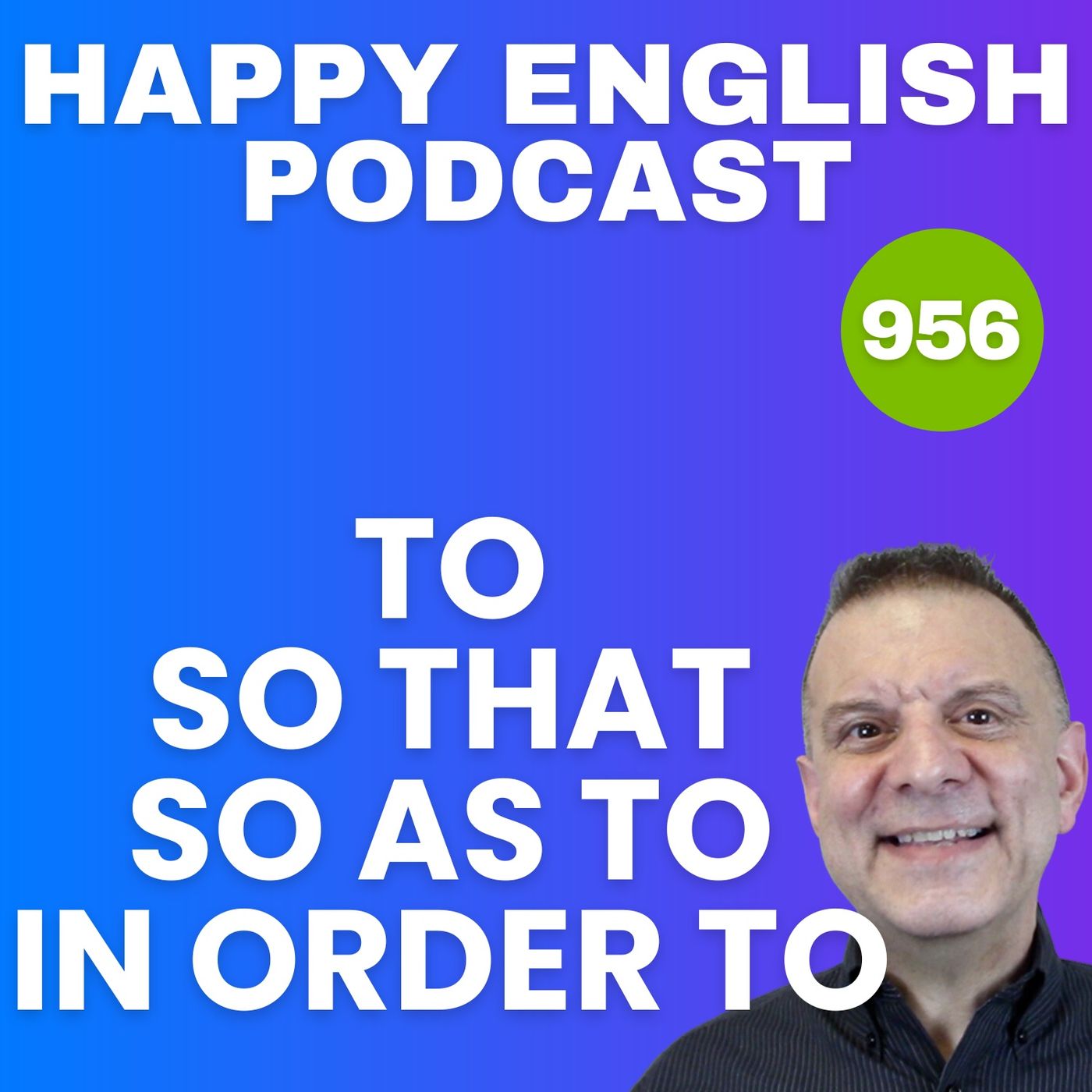
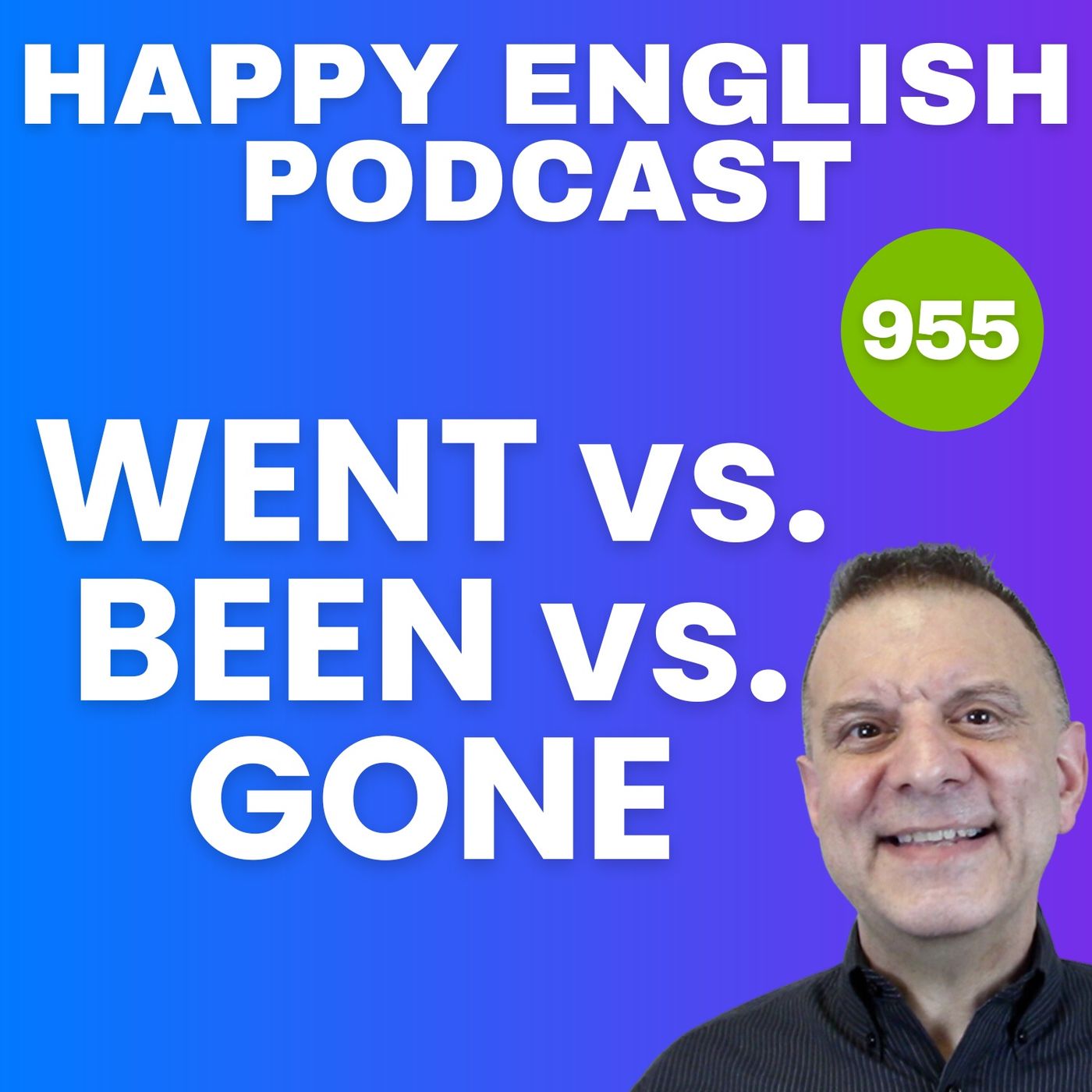
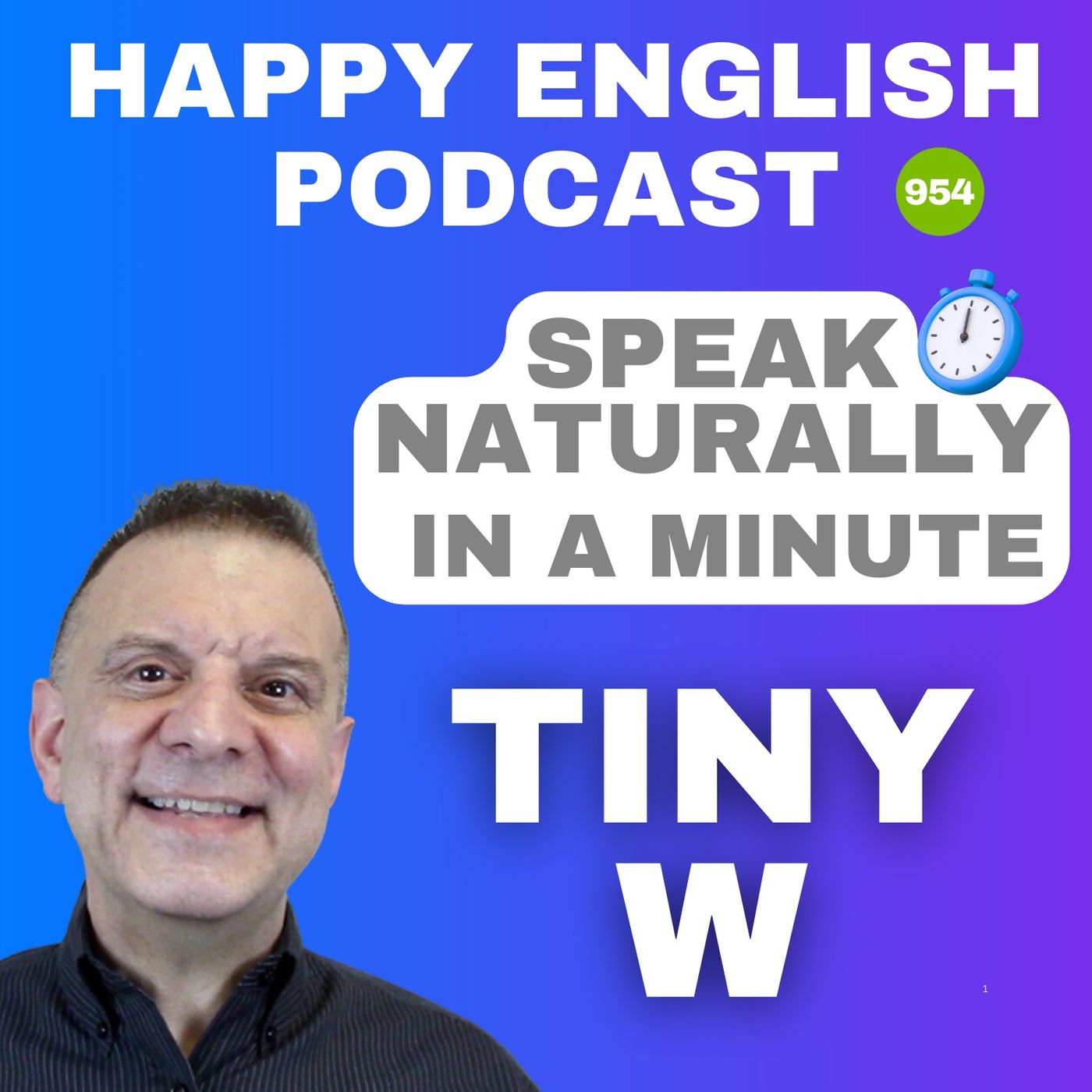
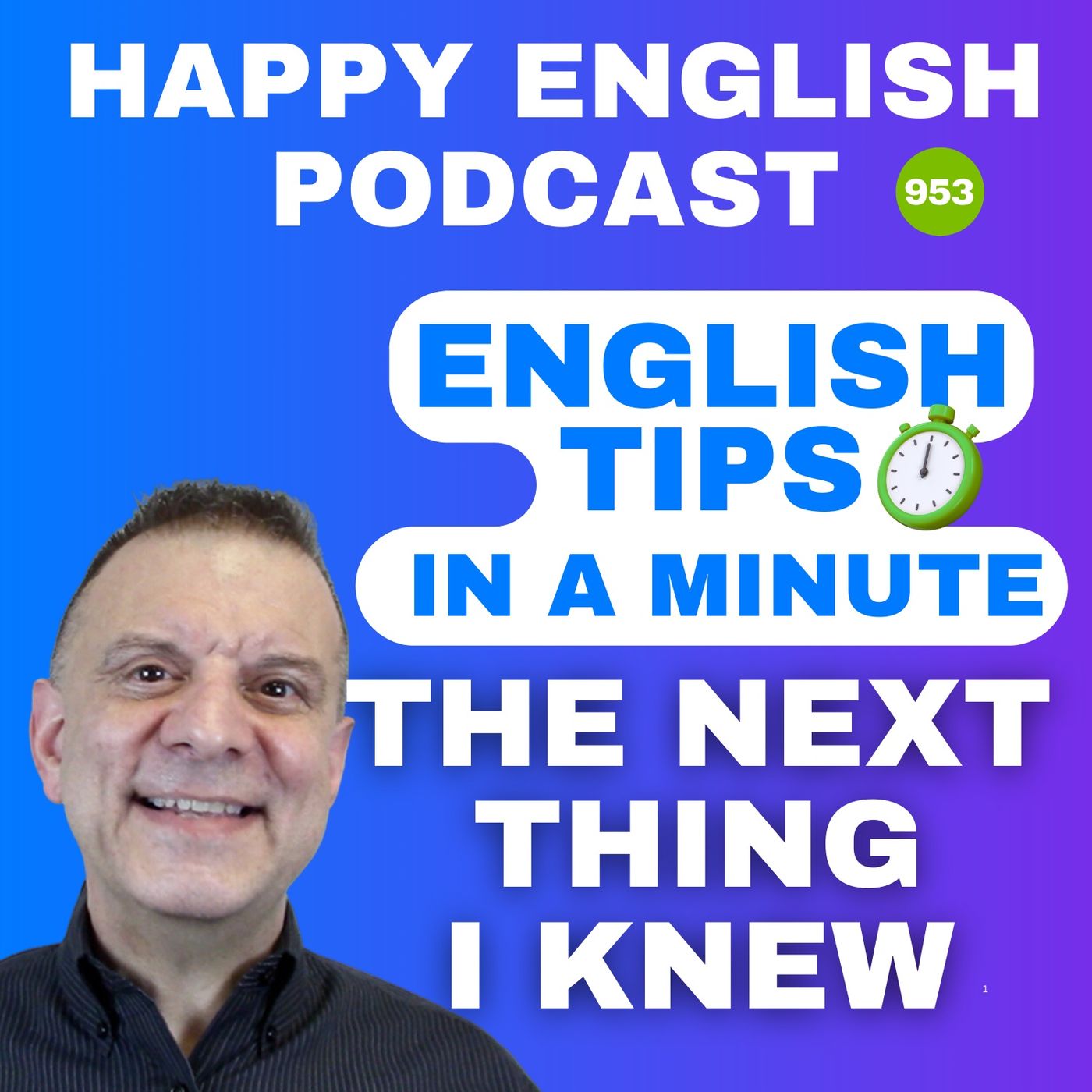
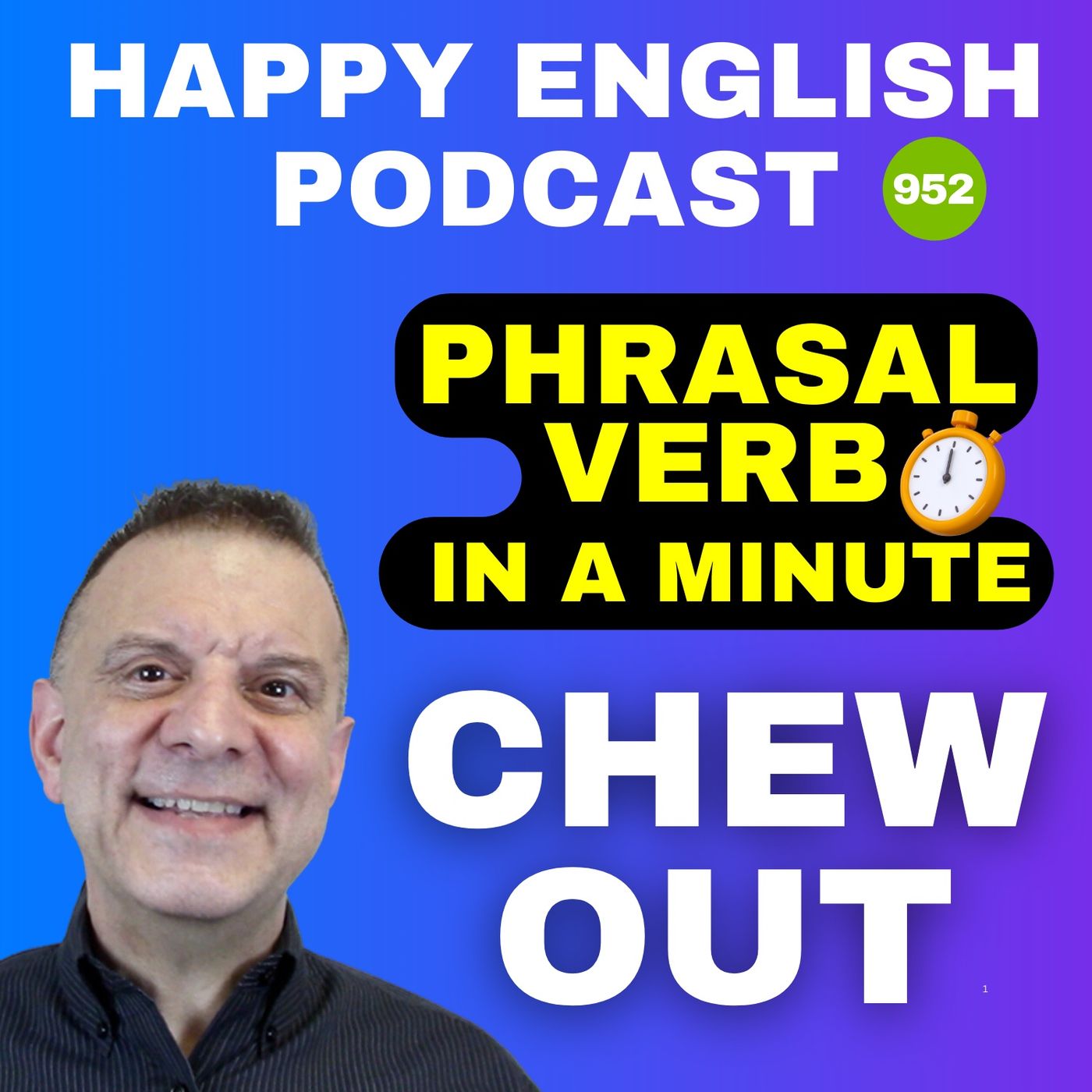
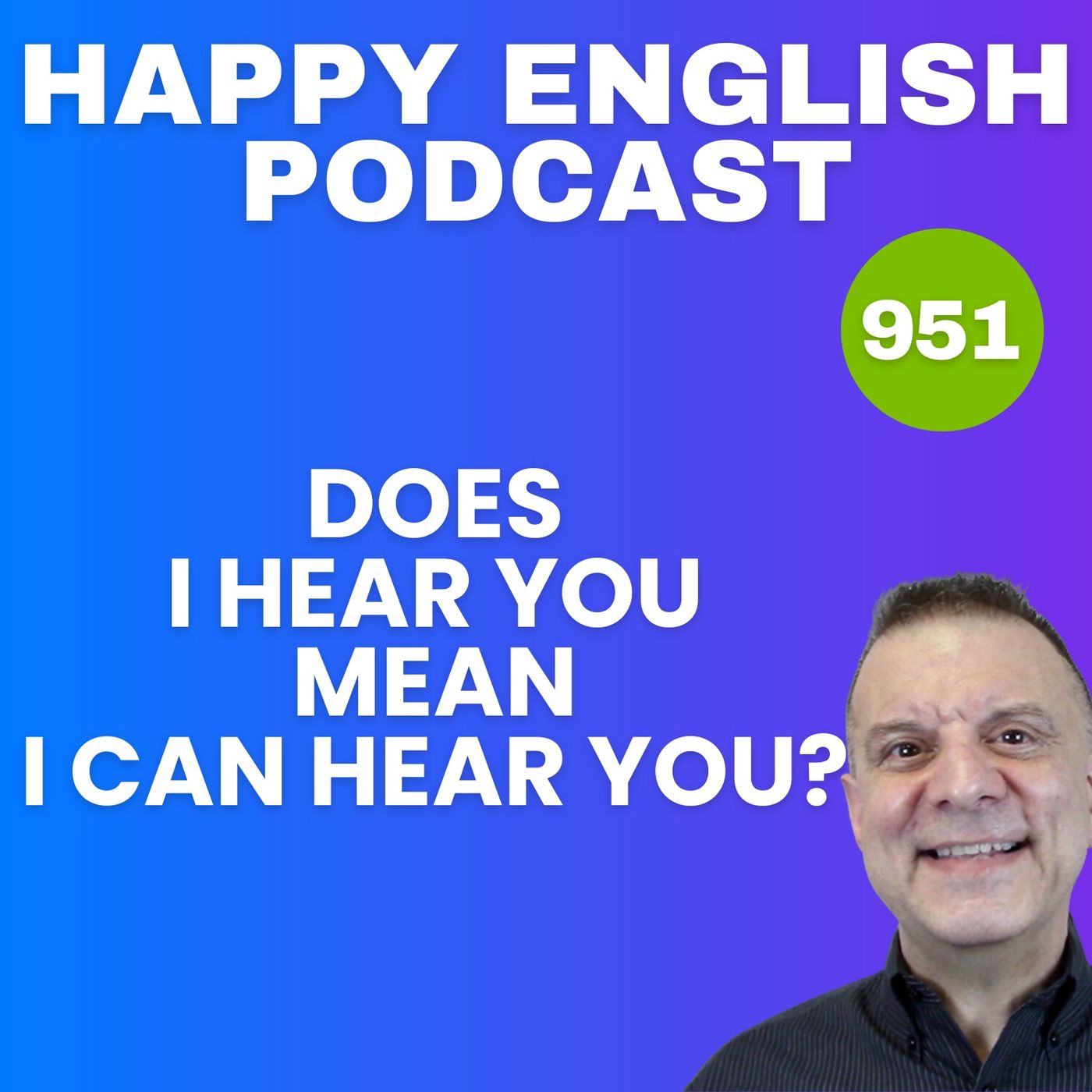
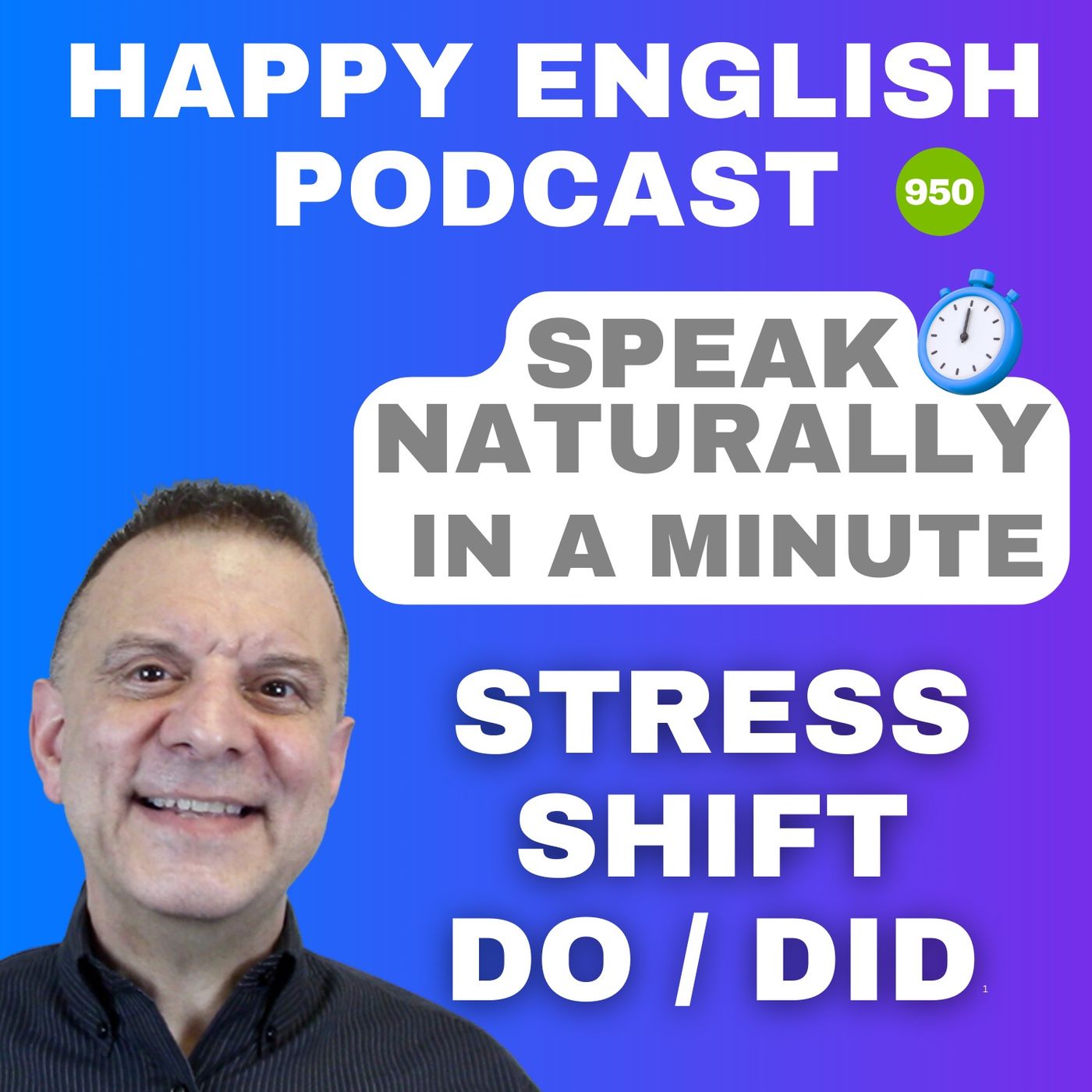
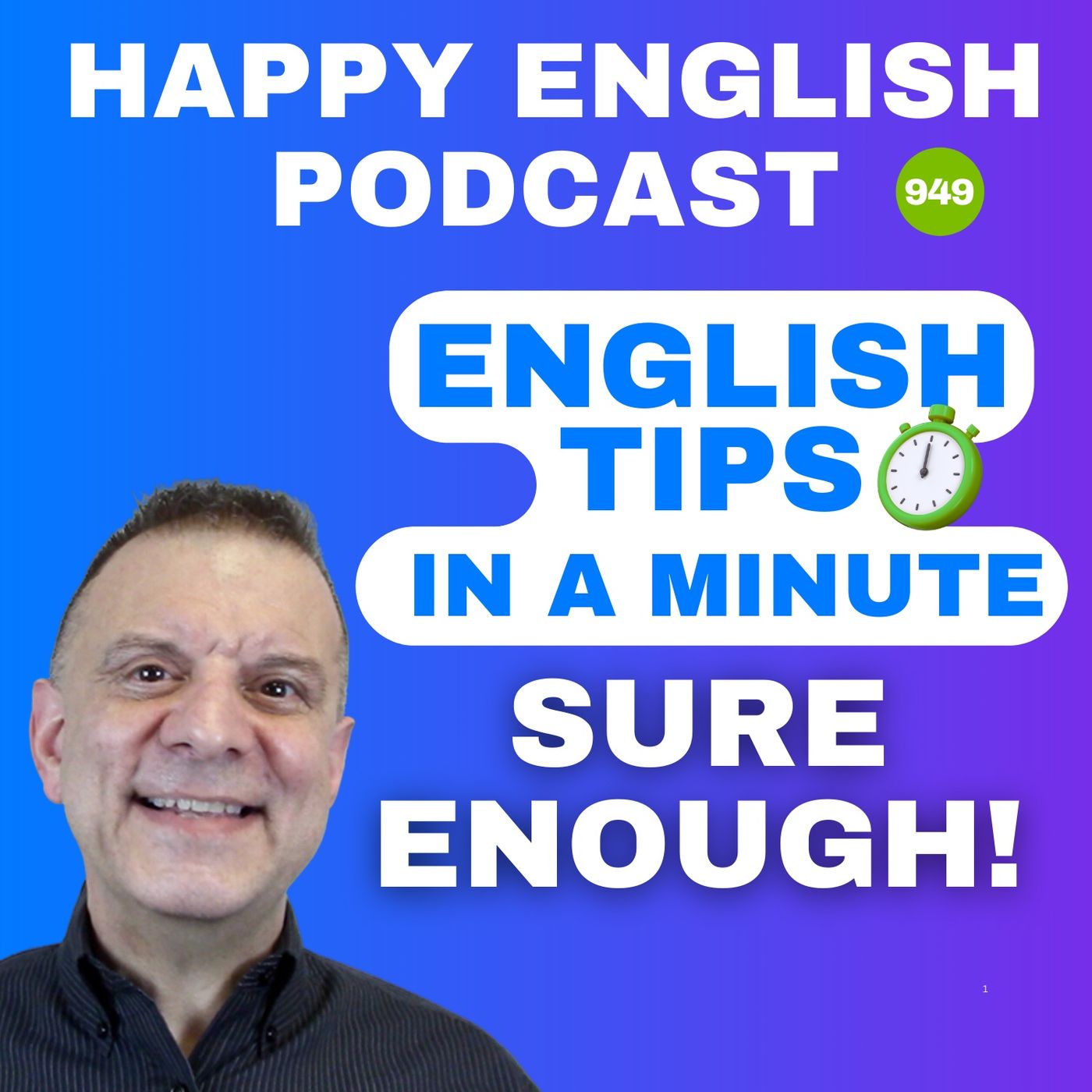

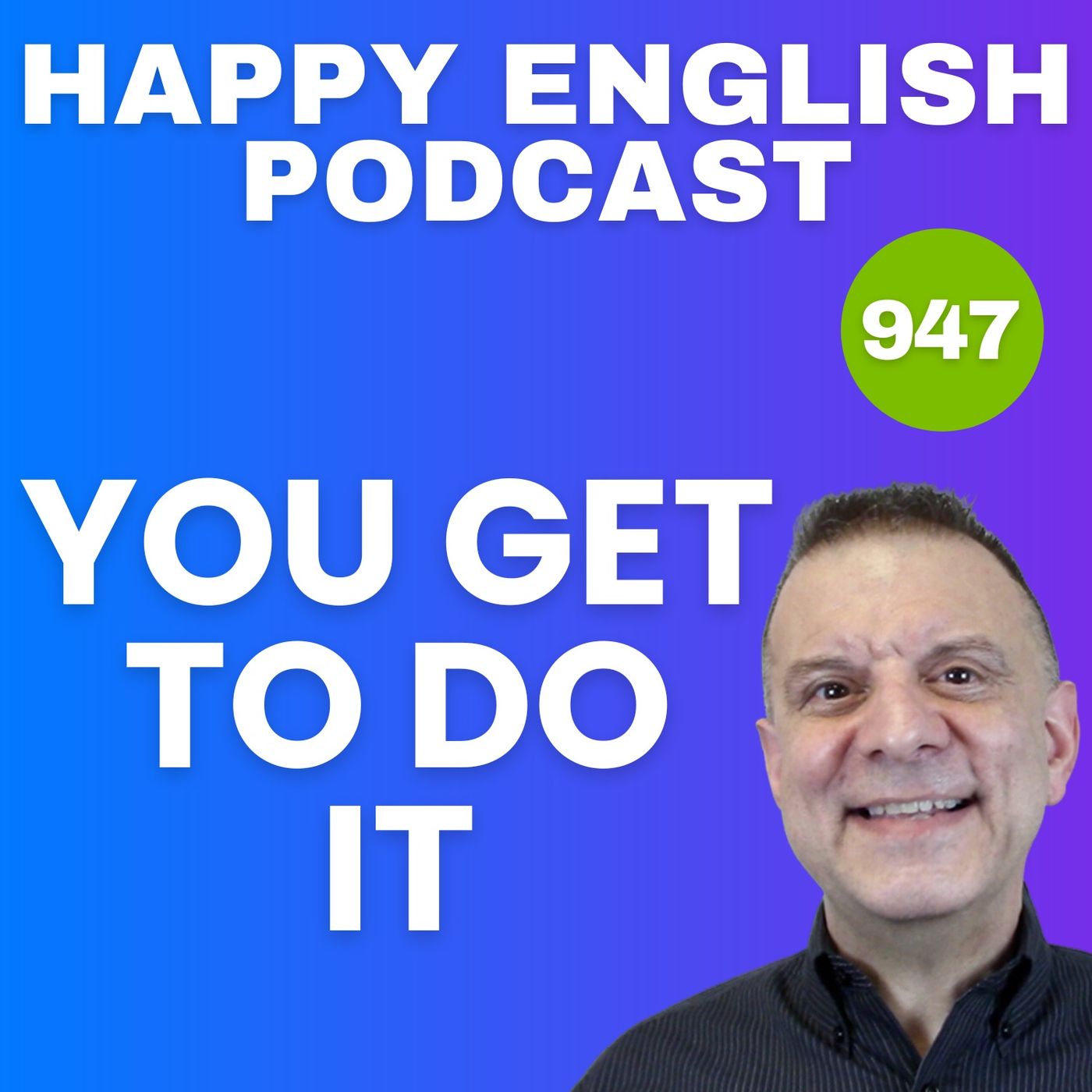
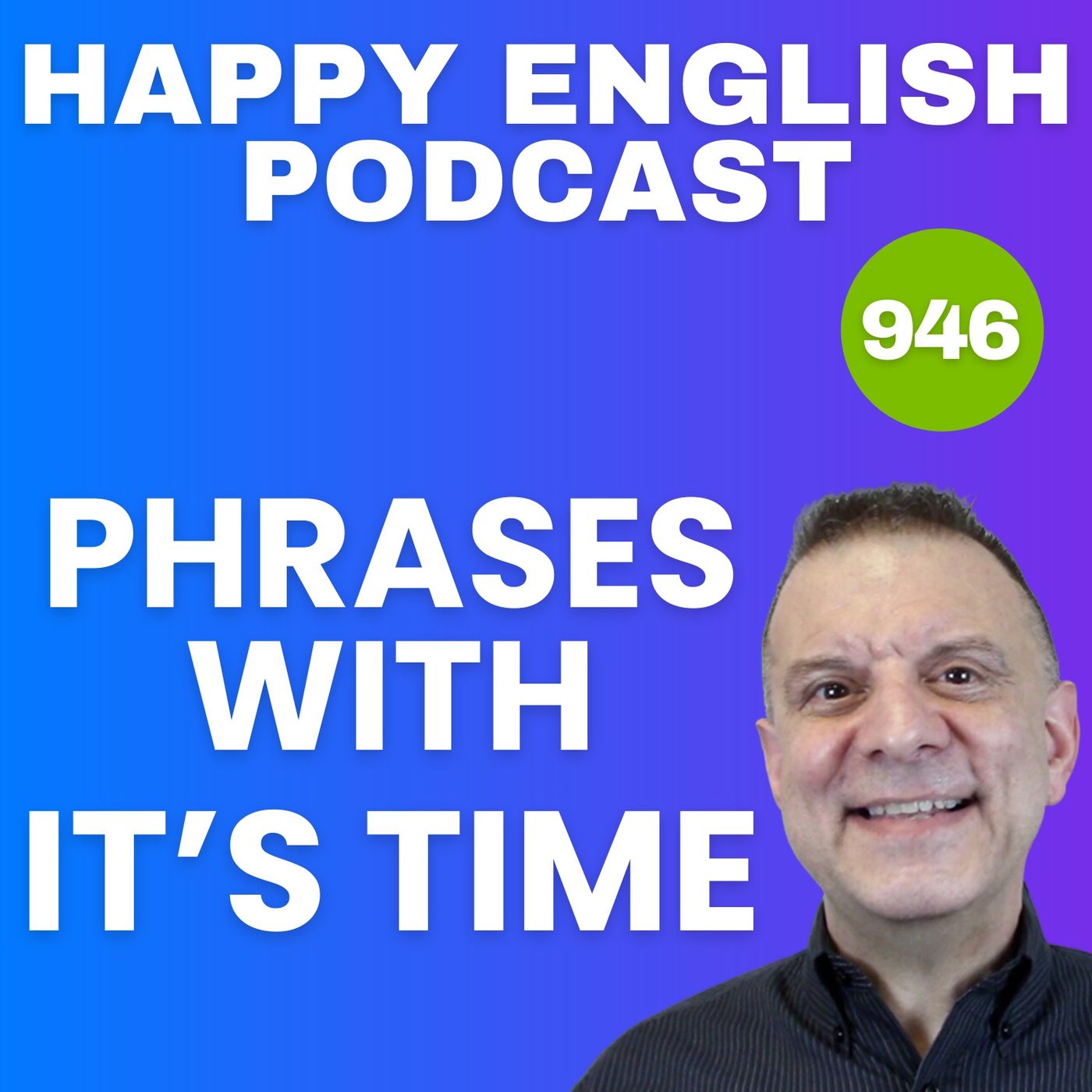
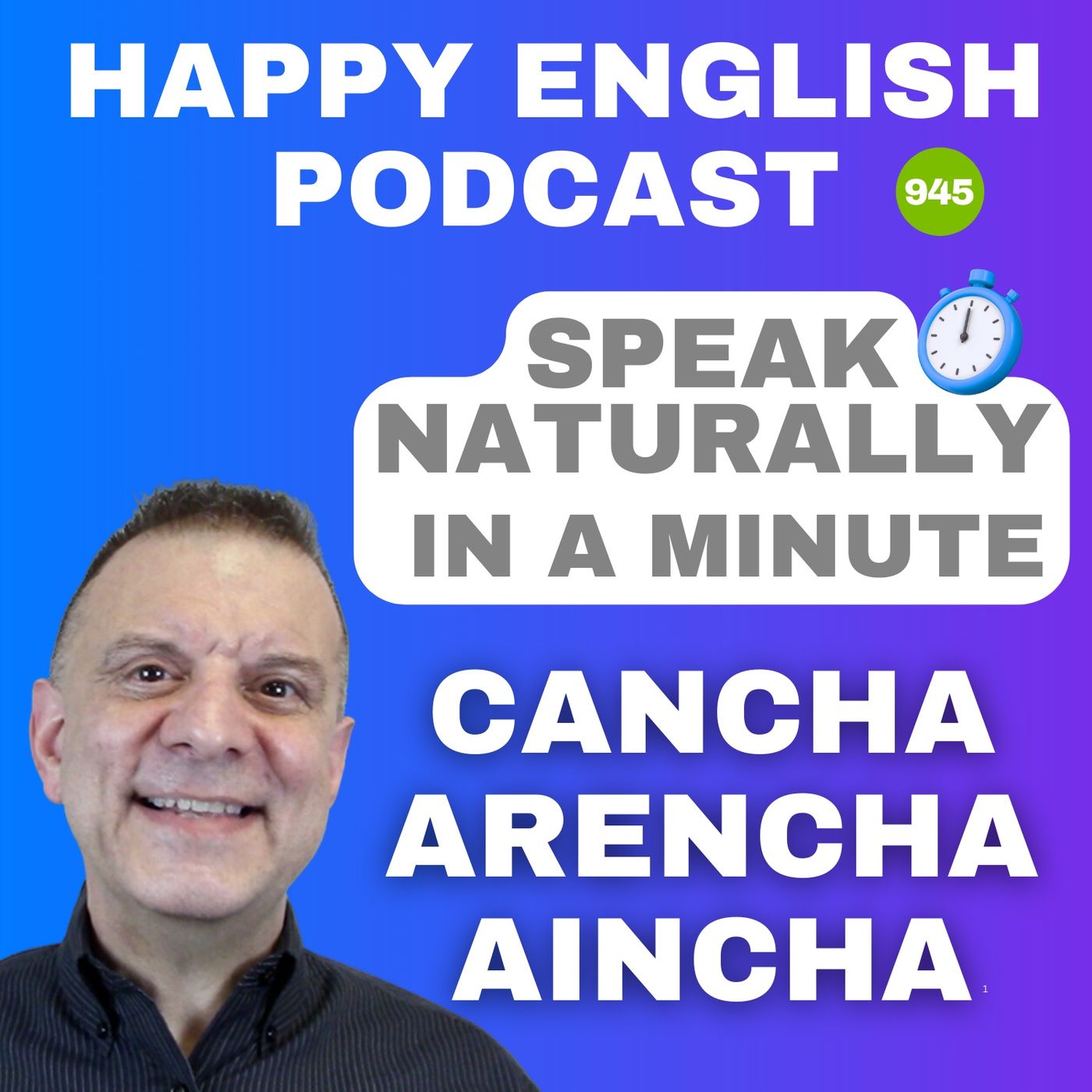
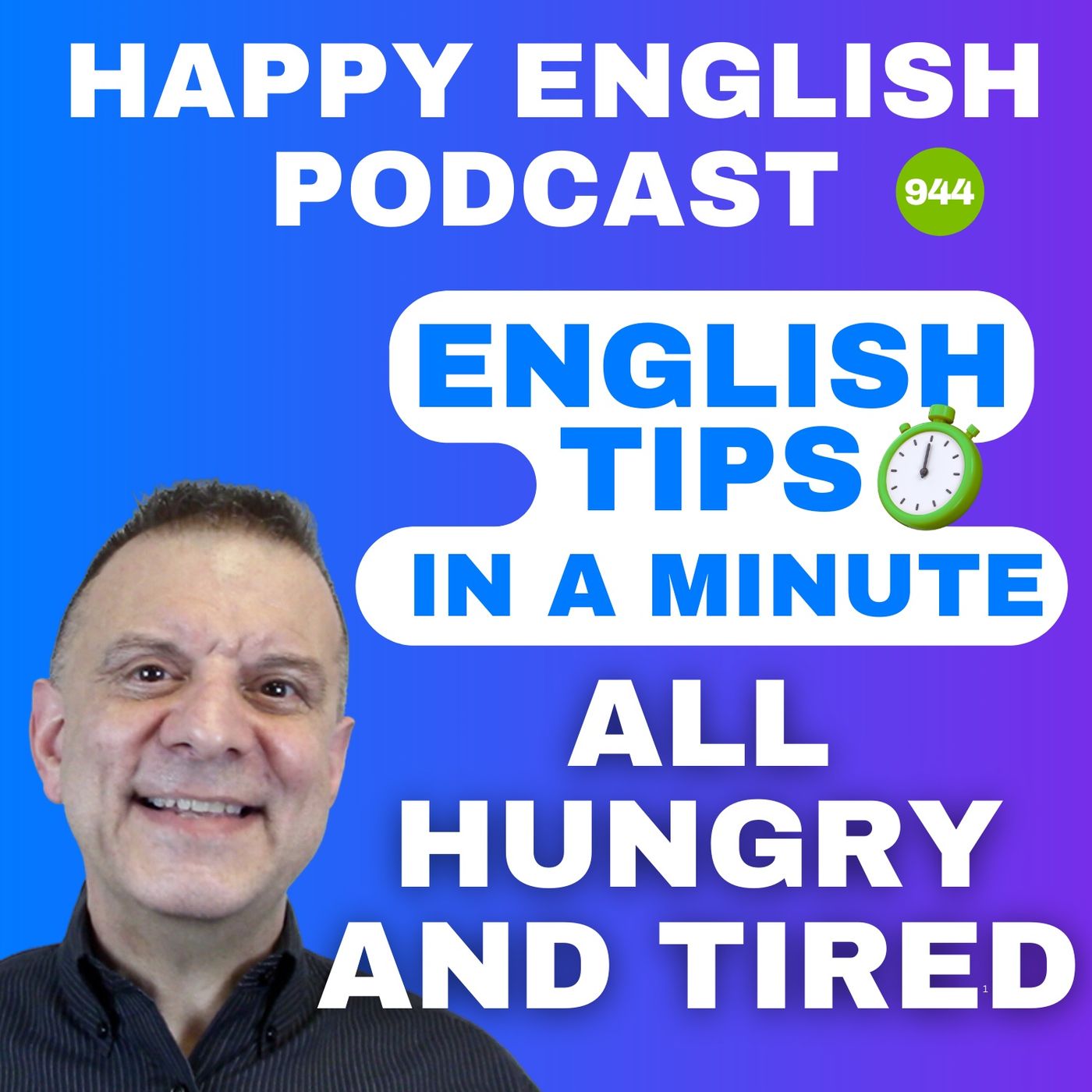

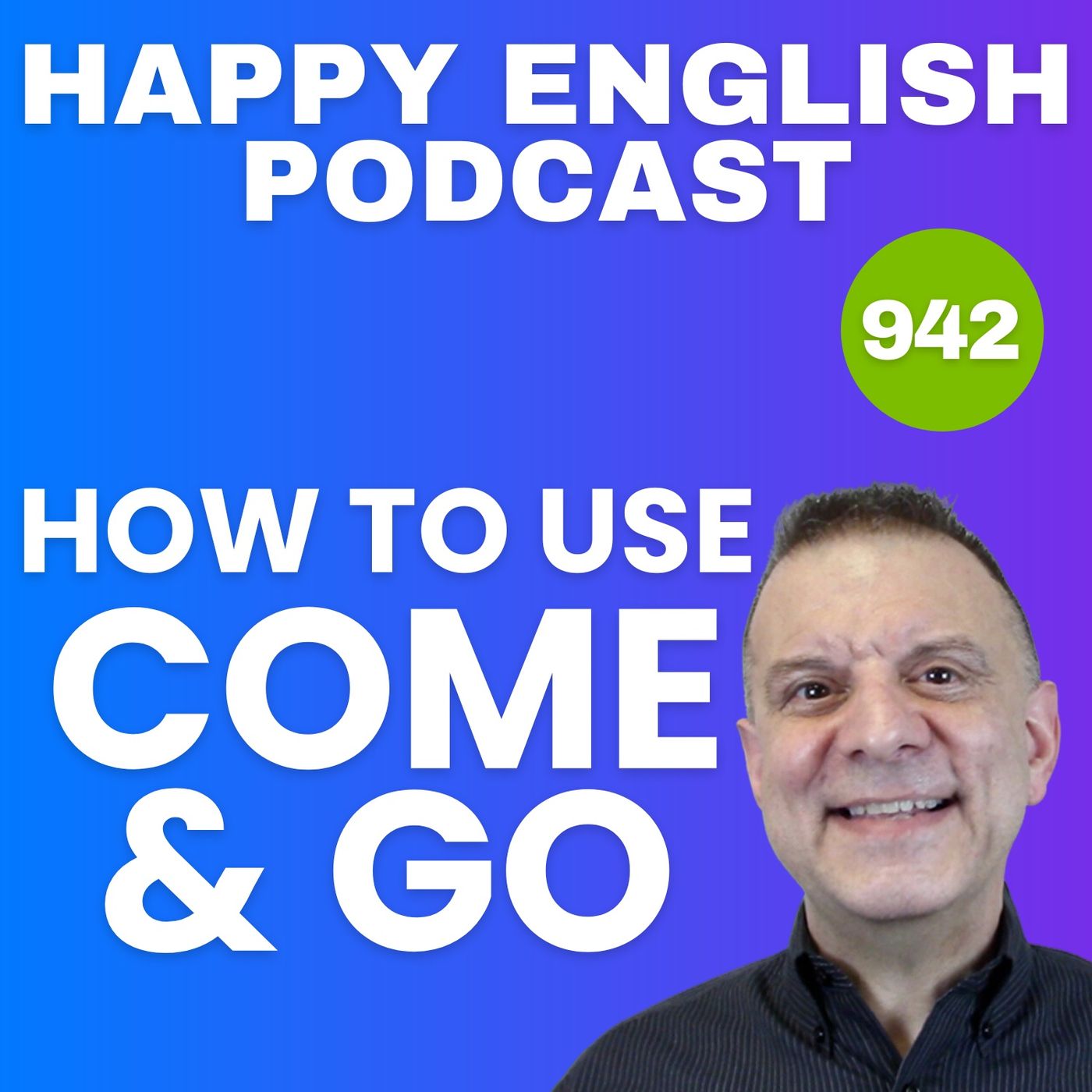
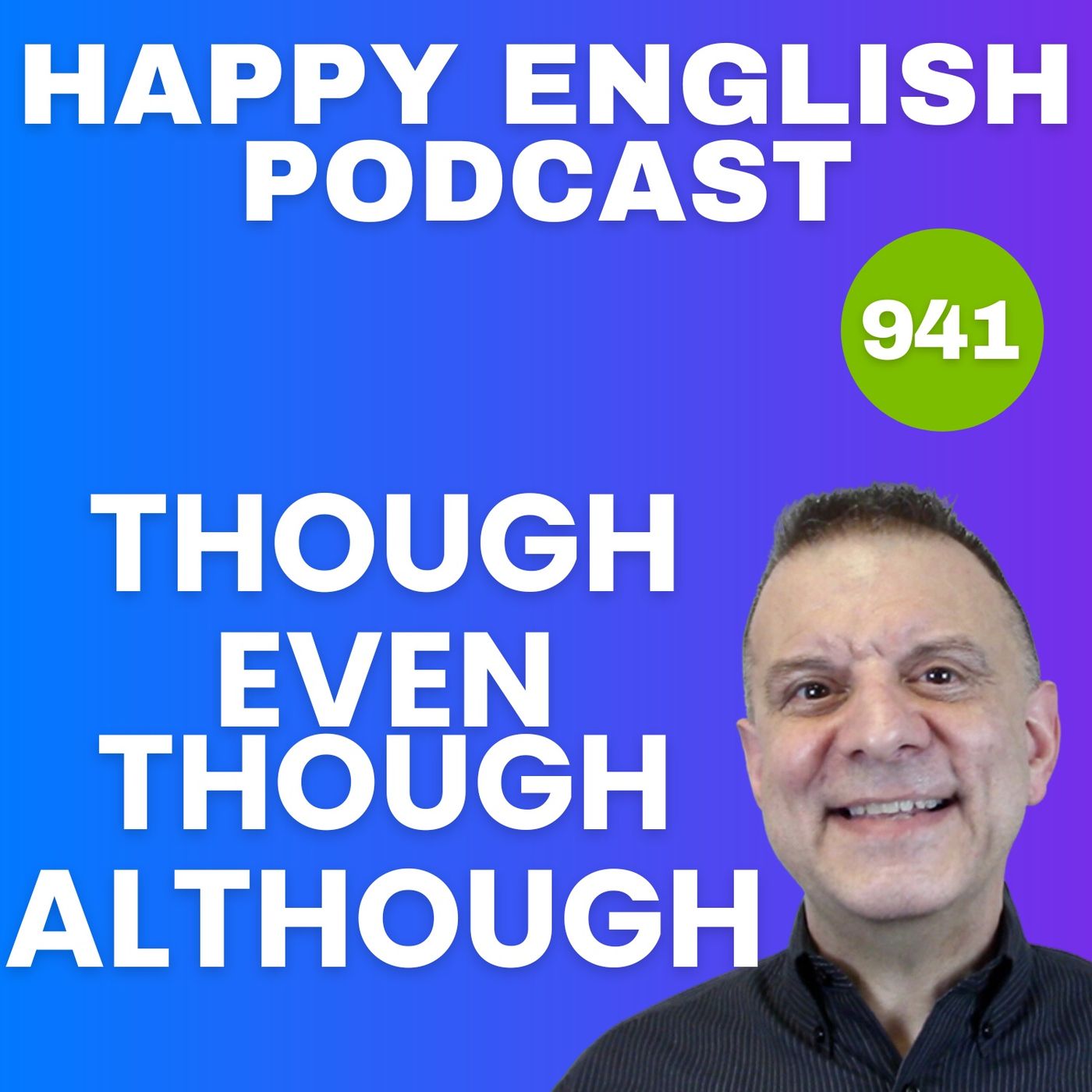
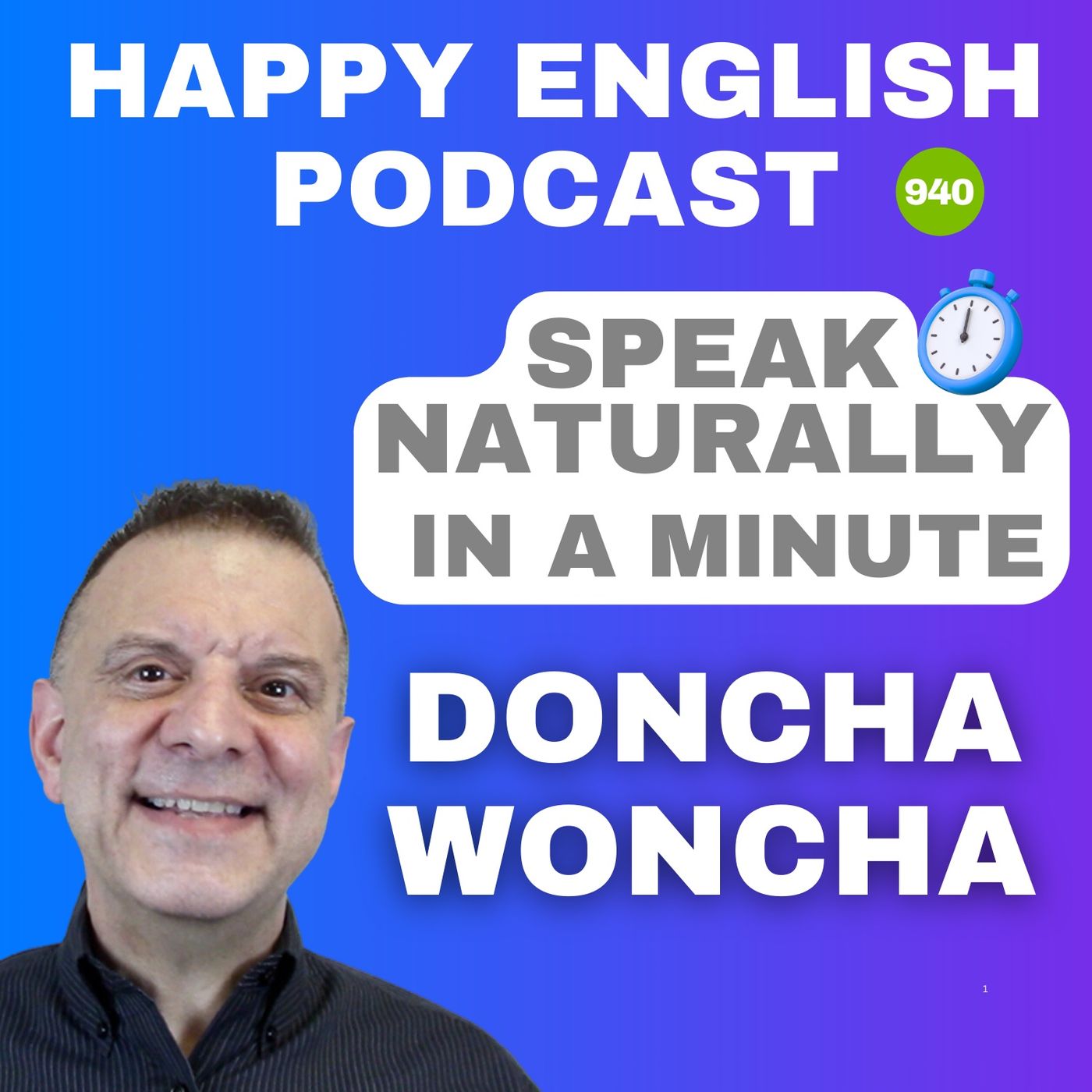
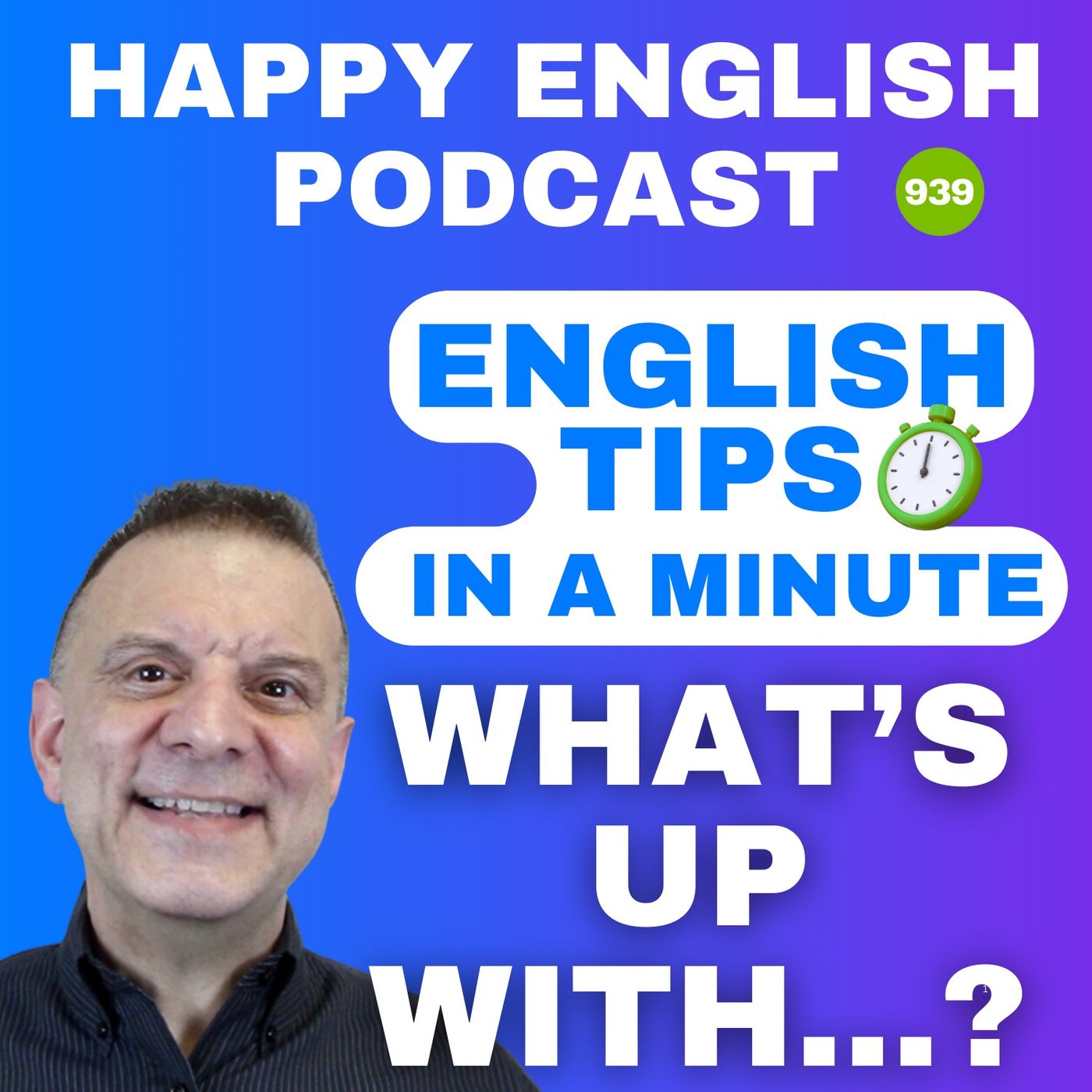
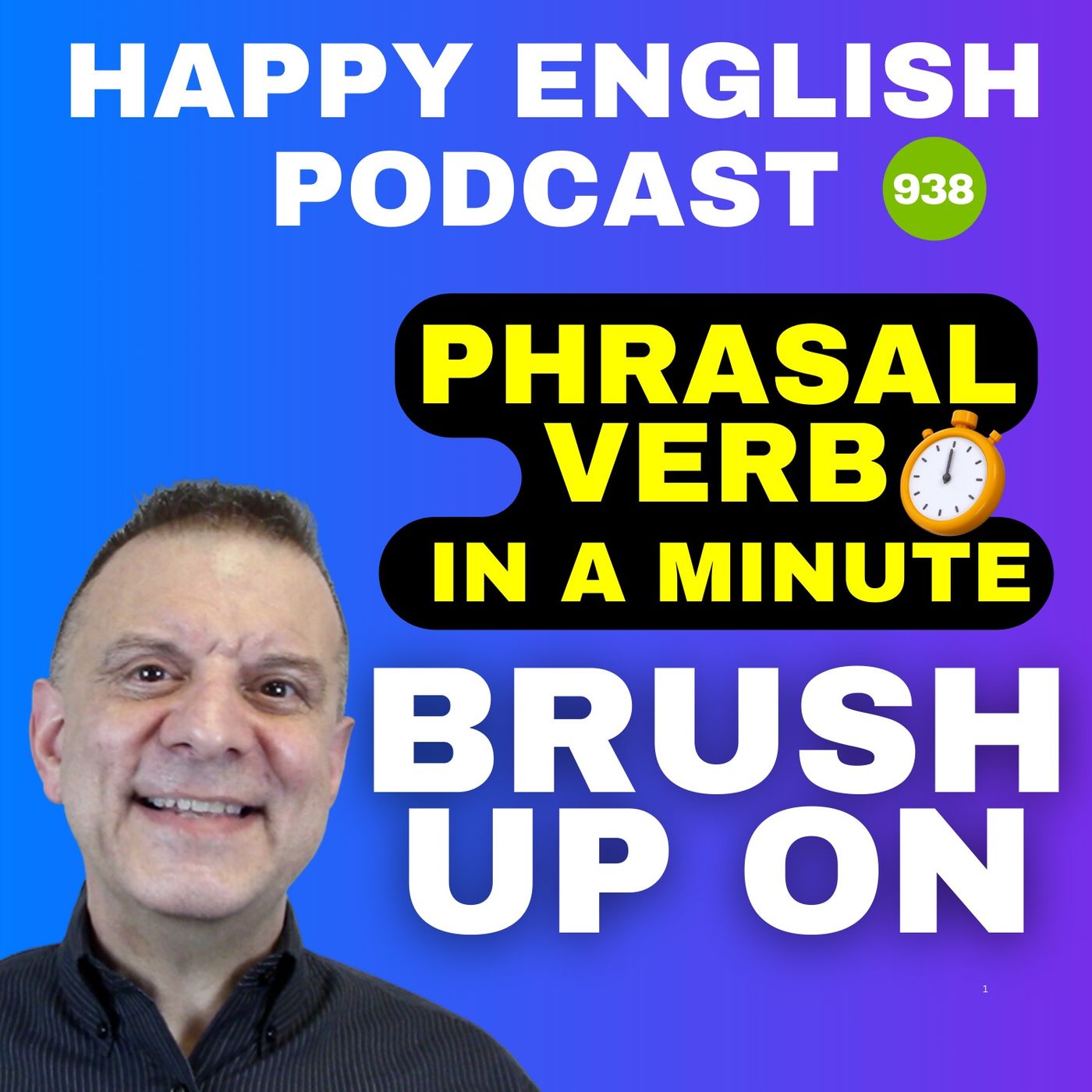
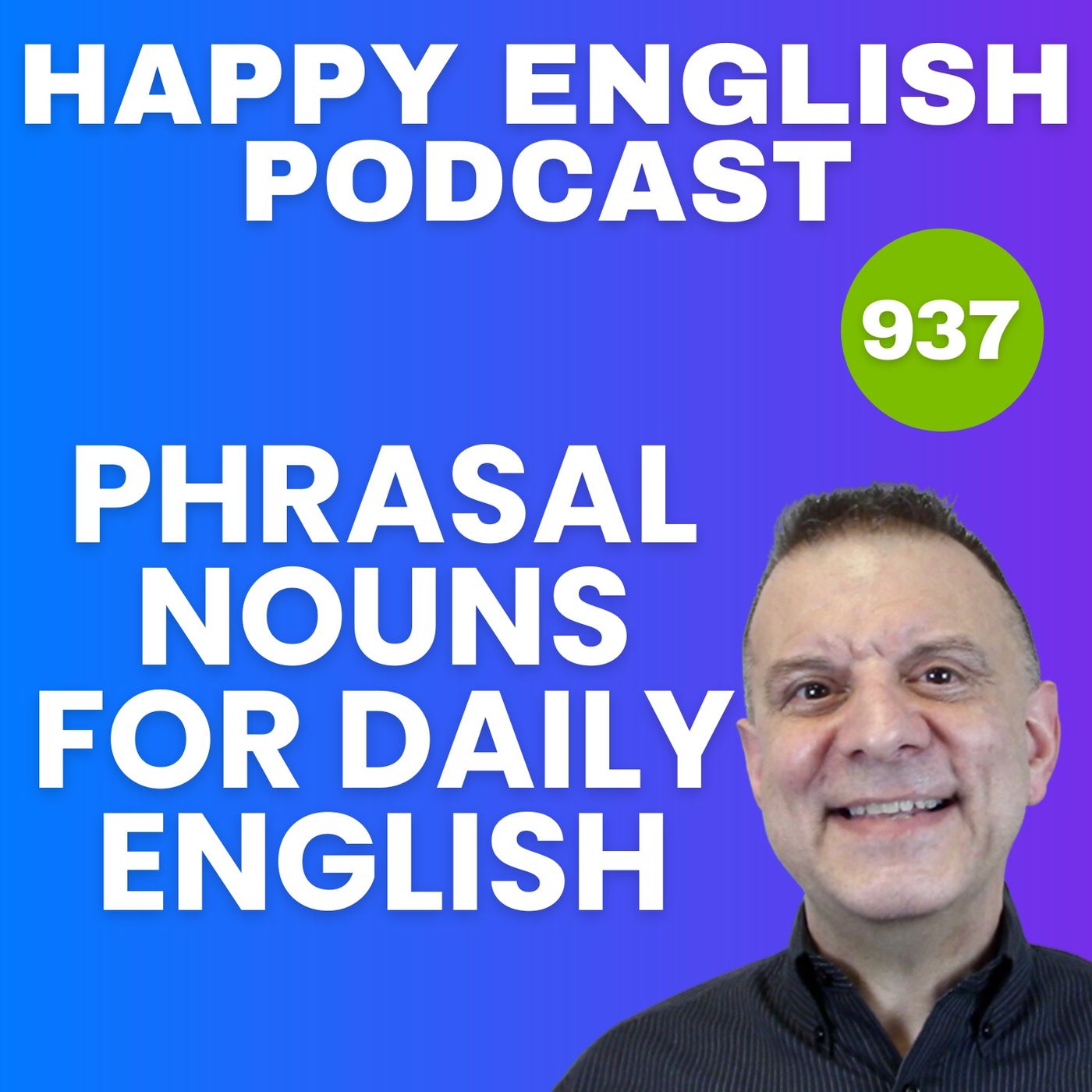



thank you Michael. you're English learning method is so 👍
I'm really appreciate it.
tanks for podcast
Thank you 😊
😍👌
useful, thanks 😊
Hi.... sorry, I got a question....can we just use them in business situations?
practical 🙏
Superb👍👍👍
It's one hell of a lesson which is so great and understandable!thanks🙏
that was great
it was great,thanks
🫶🫶
perfect 🥰
There aren't any lyrics in podcast number one that you send me
hi how can I find lyrics?
I found this podcast from the cast box app and it's so good
Thank you so much. It was very useful.
با vpn باید دانلود کنید تا باز بشه
بدون متن زیاد جالب نیست کجا متن رو پیدا کنیم